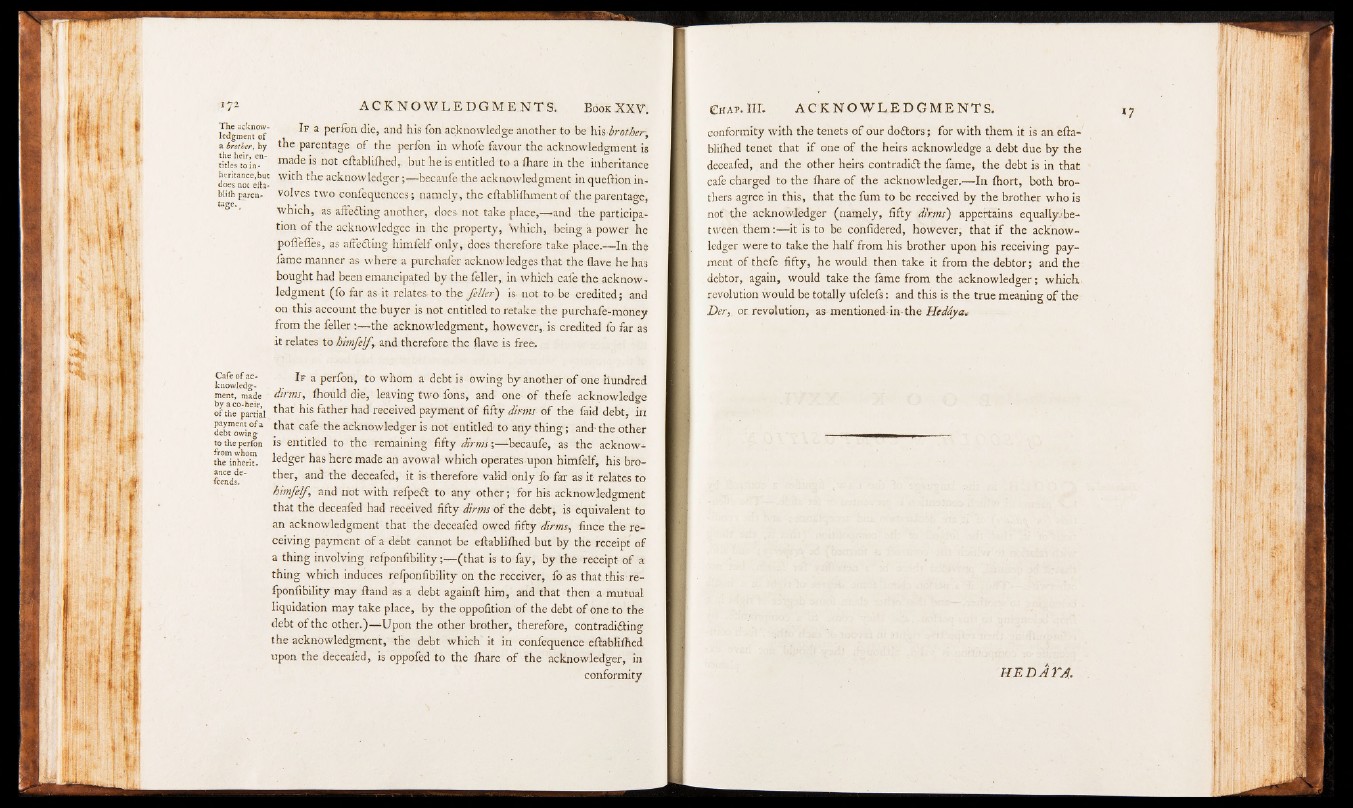
iedgmem of" a Per^ n die, and his fon acknowledge another to be \sx% brother,
a brother, by the parentage of the perfon in whofe favour the acknowledgment is
titles toin™ made is not eftablifhed, but he is entitled to a fhare in the inheritance
doe^not^fta'” acknowledger ;— becaufe the acknowledgment in queftion inbiiih
paren- volves two confequences ; namely, the eftablifhment of the parentage.
tage. 1 . . . _ , I r g p
wnicn, as airecting another, does, not take place,— and the participation
o f the acknowledgee in the property, Vhich, being a. power he
poffeflcs, as afFeCfing himfelf only, does therefore take place.— In the
fame manner as where a purchafer acknowledges that the Have he has
bought had been emancipated by the feller, in which cafe the acknowledgment
(fo far as it relates to the feller) is. not to be credited ; and
on this account the buyer is not entitled to retake the purchafe-money
from the feller :— the acknowledgment, however,, is credited fo far as
it relates to himfelf, and therefore the flave is free.
Cafe o f acknowledgment,
made
by a co-heir,
o f the partial
payment o f a
debt owing
to the perfon
from whom
the inheritance
de-
fcends.
If a perfon, to whom a debt is owing by another of one hundred
dir ms, fhould die, leaving two fons, and one of thefe acknowledge
that his father had received payment of fifty dirms of the faid debt, in
that cafe the acknowledger is not entitled to any thing; and' the other
is entitled to the remaining fifty dirms;— becaufe, as the acknowledger
has here made an avowal which operates upon himfelf, his brother,
and the deceafed, it is therefore valid only fo far as it- relates to
himfelf, and not with refpeCt to any other; for his acknowledgment
that the deceafed had received fifty dirms of the debt, is equivalent to
an acknowledgment that the deceafed owed fifty dirms, fince the receiving
payment of a debt cannot be eftablifhed but by the receipt of
a thing involving refponfibility;— (that is to fay, by the receipt of a
thing which induces refponfibility on the receiver, fo as that this refponfibility
may fland as a debt againft him, and that then a mutual
liquidation may take place, by the oppofition of the debt of one to the
debt of the other.)—-Upon the other brother, therefore, contradicting
the acknowledgment, the debt which it in confequence eftablifhed
upon the deceafed, is oppofed to the fhare o f the acknowledger, in
conformity
C h a p . I I I -
eonformity with the tenets of our dodtors; for with them it is an eftablifhed
tenet that i f one of the heirs acknowledge a debt due by the
deceafed, and the other heirs contradict the fame, the debt is in that
cafe charged to the fhare of the acknowledger.— In fhort, both brothers
agree in this, that the fum to be received by the brother who is
nof the acknowledger (namely, fifty dkms) appertains equally.<be-
tween them:— it is to be confidered, however, that i f the acknowledger
were to take the half from his brother upon his receiving payment
of thefe fifty, he would then take it from the debtor; and the
debtor, again, would take the fame from the acknowledger; which
revolution would be totally ufelefs: and this is the true meaning of the
Der, or revolution, asmentionedinthe He day a.-
H E D A T A .